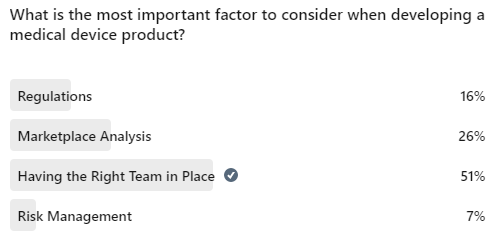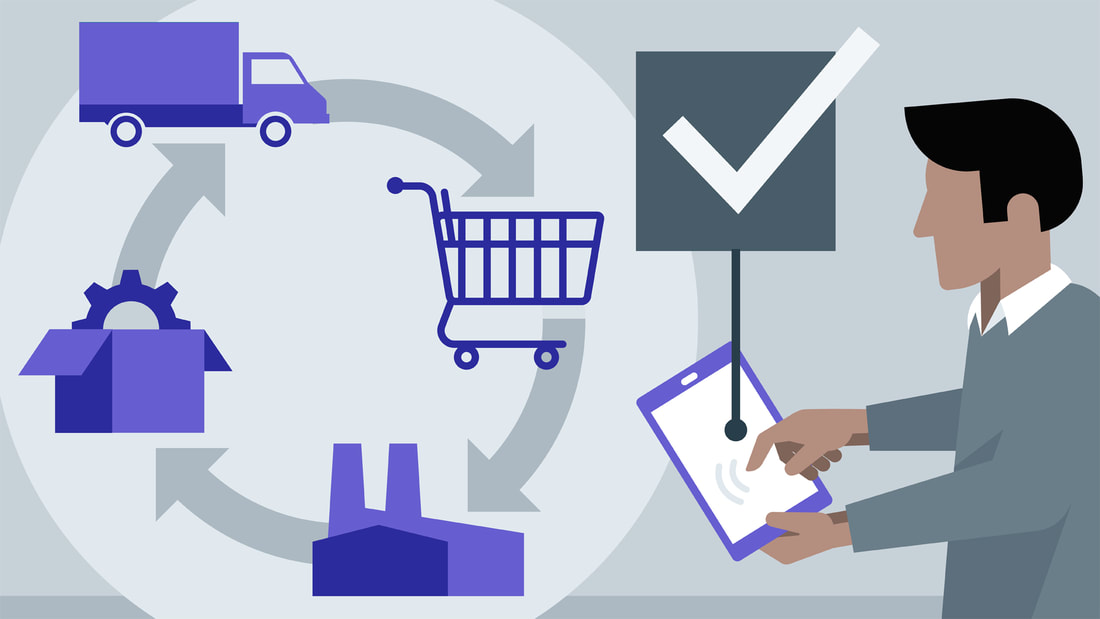|
Recently our company published a poll online offering up the following question for the medical device community: “What is the most important factor to consider when developing a medical device product?” At the close of the poll dozens of people had cast their votes for what they believed to be the factors affecting product development the most. The poll options included:
If you have been in industry for any length of time you know there are dozens of factors which can and often have a direct impact on the product development process. While there are dozens to consider, such as PRS (Product Requirement Specification), planning, user experience, DFM, etc. what we know to be true is each of these factors carry varying weights of impact. They are not all equal in measure or influence. As our poll launched and picked up steam one of the four factors listed as an option began to take a commanding lead. The respondents, who are largely made up of medical device professionals and executives, had identified a common factor which stood above the rest in its ability to impact positively or negatively the product development process. What was this most important factor? Would you have guessed ‘Having the Right Team in Place’ is the number one factor which determines success when developing a medical device product? ‘Having the Right Team in Place’ was identified by 51% of the respondents as being the most important factor which directly contributes to the success of medical device product development. The other options broke down as follows: Simply put – having the right team in place covers all of the other areas that potentially could produce challenges during the product development cycle. Whereas the inverse is certainly all too true. When we have the wrong team in place, or teammates lacking the capabilities to facilitate their job as needed by the company, inevitably problems go arise which hold back otherwise good opportunities and technology offerings. Jim Collins, celebrated author (books like ‘Good to Great’ & ‘Built to Last’) and business management guru, is quoted as saying “Leaders of great companies start by getting the right people on the bus, the wrong people off the bus, and the right people in the right seats.” What this means is it’s more about the people than it is the technology or problem you’re solving. This is an important lesson, especially for first time entrepreneurs and startup executives. You can have the best product idea in the world, one that is in high demand, but if you don’t have the right team in place you’ll most likely spin your wheels while blowing out copious amounts of money in the process. We’ve also seen this reality in person dozens of times. As a medical device consulting firm we work with a lot of companies, both start up and conglomerate alike. One of the consistent characteristics we see within the companies which are able to drive success, often times repeated success, is their management team is comprised of experts in their particular field who know how to both lead and operate in the weeds. They both strategic and tactical, able to plan for the long term while addressing todays shorter term needs. As a result, they know how the job is done and therefore can either lead or delegate those tasks helping to guide their department or team to successful completion. When you have the right people on the team (your bus) you will then find opportunities (the medical problem you’ll solve) to move forward with. Following this process you’ll also have a far better chance of facilitating that opportunity through the development process and into commercialization, or acquisition.
0 Comments
When we look at a how most businesses operate we learn there is a consistent and heavy reliance on external parties to help the organization operate effectively. The larger the business the more reliance they typically have on external people and or companies to help them achieve their goals.
For start up businesses it’s common to see them rely on external service companies and consultants which provide support in areas such as finance, accounting, HR, logistics, even sales. If you’re a product based company your supply chain inevitably includes people or companies which provide product support such as design, prototyping, packaging, raw materials/ components, etc. Many of us rely on our suppliers to help us run our business efficiently, but are we truly maximizing these partnerships? Lot’s of small company’s use ADP to process their payroll. ADP is considered the gold standard in payroll processing as they offer their service across a broad range of business sizes and industries, provide a thorough and well-crafted service which is customizable and affordable. For many small businesses it’s a no brainer to use ADP for payroll processing because ADP does it far more effective and at a cheaper cost than most small businesses could do on their own. Here’s the catch – did you know ADP also offers support in talent acquisition tools, benefits administration, HR services (including outsourcing/ PEO), employee system integrations and even marketplace apps? I didn’t! I always thought of ADP as a payroll provider, little did I know that ADP also offers at least five other major services, all of which carry the same ADP quality of service and support. This is where we fall short in utilizing our suppliers to maximize the impact on our business. If we don’t know all of the services or areas of support our suppliers offer we can’t align those services with our business needs. Last year a start up medical device client of ours came to us with a problem. They needed to do some concept feasibility research on a particular product idea they had which if it made it to market it would significantly aide them in completing against their two closest competitors. They contacted our company not to help them with the project, but to help them with a referral to a local Orange County, CA based company that specialized in designing and testing early stage concepts. Damn it! That was a hard pill to swallow. My company, through yours truly, had been working with this start-up for several years and this client, who we had a good relationship with, didn’t know all of the services we could and do provide. That was an invaluable learning lesson. I had assumed all along that our client knew we also provided concept design and small stage prototype testing. I was wrong. As the old saying goes “when we assume we make an ass out of you and me.” That saying should be re-written to say “when we assume we make an ass out of me and me only.” After I listened to our customers situation and the support they were looking for it was apparent we would be a great option for them. The conversation thereafter was rather amusing and equally humbling as our customer told us “oh really, I had no idea you also offered that service. We would love to work with you all on the project, you already know our system, product lines and the people running the project. How do we get started?” I remember hanging up the phone and laughing to myself thinking, “how many other customers do we have that think of us in one way yet have no idea about the other services we provide.” The next several months after this realization I spent all my efforts educating our current customer base on our full suite of services, not just the one area of support our customers had grown to rely on us for. It would prove to be a valuable learning lesson on my end needless to say. Seven months later we finished the concept feasibility project, three weeks ahead of schedule, for the customer I had mentioned earlier. At the completion of the project I asked our customers VP R&D for his feedback on the project, our involvement, our work output and of course “would he use us again for other development needs they had?” His response, “you all did a great job. We honestly had no idea you did concept work. We would rather give the work to an existing supplier, like you, we trust than go out and start a new relationship with someone we have no history with. Interestingly enough, after we learned that about your firm and the other services you offer which we didn’t know about we went back to several other key suppliers and ask them for information on other services they offered. In one instance we ended up saving almost 19% on our annualized material costs because we shifted the majority of our material purchasing needs over to another existing supplier. We love working with them and their prices were very competitive, we just had no idea they offered other materials outside of what we were already purchasing from them.” Yahtzee! Here in lies the ‘Ah-Ha’ moment and perhaps the reason you’re reading this article in the first place. Inevitably you are working with suppliers at present which you only have a narrow view of how they can help your business. Take a moment to reach out to those suppliers of yours and learn about their full suite of services and or capabilities. You may just find out there’s a handsome cost or time savings for you just around the corner. Key Take Away: Don’t assume you know everything about your supply base. Most likely you’re working with suppliers you don’t have a full understanding of their capabilities. Take the time to learn more about your supply base and how those existing relationships can further maximize the impact they’re making on your business. Action Item: Reach out to your best or favorite top 5 suppliers for the sole purpose of learning about their full suite of services and capabilities. Identify where you are presently working with them and the areas you aren’t. Does this supplier offer additional services that you could benefit from? Better yet, do they offer a service which you presently have contracted with another company you aren’t thrilled with? This is a great time to begin reviewing your supply chain to see if there are areas of your business that would be positively impacted by working with the suppliers you like working with? When you begin to ‘bundle’ more projects and opportunities with your supply base you stand to greatly reduce your time and cost associated with your supply chain. About the AuthorTravis Smith is the founder and managing director of Square-1 Engineering, a medical device consulting firm, providing end to end engineering and compliance services. He successfully served the life sciences marketplace in SoCal for over 15 years and has been recognized as a ‘40 Under 40’ honoree by the Greater Irvine Chamber of Commerce as a top leader in Orange County, CA. Categories
All
Archives
July 2024
|
Visit Square-1's
|
|






 RSS Feed
RSS Feed


